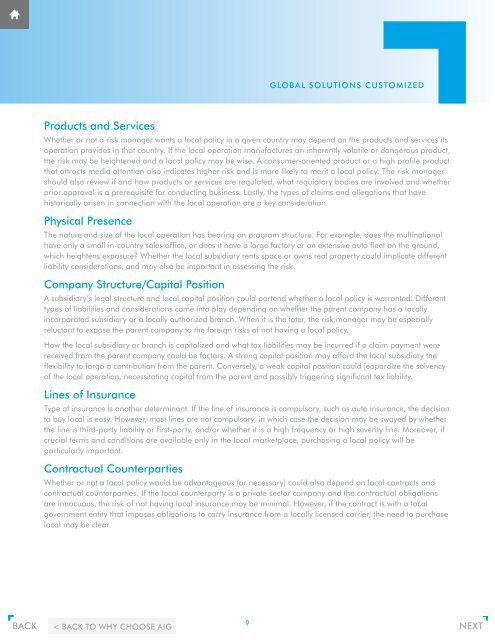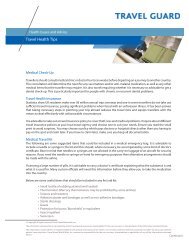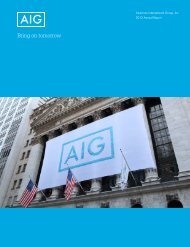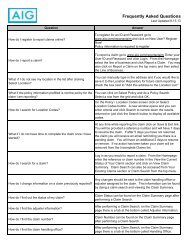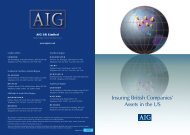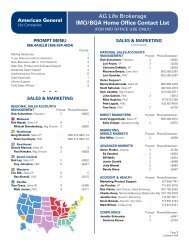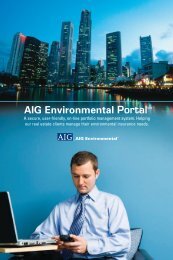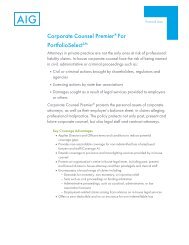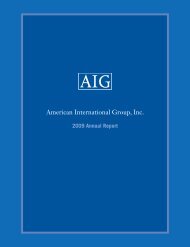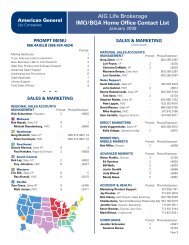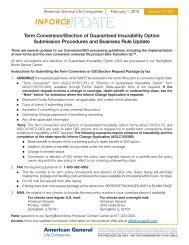fully interactive pdf - AIG.com
fully interactive pdf - AIG.com
fully interactive pdf - AIG.com
- No tags were found...
You also want an ePaper? Increase the reach of your titles
YUMPU automatically turns print PDFs into web optimized ePapers that Google loves.
GloBal SolutionS CuStoMizedProducts and ServicesWhether or not a risk manager wants a local policy in a given country may depend on the products and services itsoperation provides in that country. If the local operation manufactures an inherently volatile or dangerous product,the risk may be heightened and a local policy may be wise. A consumer-oriented product or a high profile productthat attracts media attention also indicates higher risk and is more likely to merit a local policy. The risk managershould also review if and how products or services are regulated, what regulatory bodies are involved and whetherprior approval is a prerequisite for conducting business. Lastly, the types of claims and allegations that havehistorically arisen in connection with the local operation are a key consideration.Physical PresenceThe nature and size of the local operation has bearing on program structure. For example, does the multinationalhave only a small in-country sales office, or does it have a large factory or an extensive auto fleet on the ground,which heightens exposure? Whether the local subsidiary rents space or owns real property could implicate differentliability considerations, and may also be important in assessing the risk.Company Structure/Capital PositionA subsidiary’s legal structure and local capital position could portend whether a local policy is warranted. Differenttypes of liabilities and considerations <strong>com</strong>e into play depending on whether the parent <strong>com</strong>pany has a locallyincorporated subsidiary or a locally authorized branch. When it is the later, the risk manager may be especiallyreluctant to expose the parent <strong>com</strong>pany to the foreign risks of not having a local policy.How the local subsidiary or branch is capitalized and what tax liabilities may be incurred if a claim payment werereceived from the parent <strong>com</strong>pany could be factors. A strong capital position may afford the local subsidiary theflexibility to forgo a contribution from the parent. Conversely, a weak capital position could jeopardize the solvencyof the local operation, necessitating capital from the parent and possibly triggering significant tax liability.lines of insuranceType of insurance is another determinant. If the line of insurance is <strong>com</strong>pulsory, such as auto insurance, the decisionto buy local is easy. However, most lines are not <strong>com</strong>pulsory, in which case the decision may be swayed by whetherthe line is third-party liability or first-party, and/or whether it is a high frequency or high severity line. Moreover, ifcrucial terms and conditions are available only in the local marketplace, purchasing a local policy will beparticularly important.Contractual CounterpartiesWhether or not a local policy would be advantageous (or necessary) could also depend on local contracts andcontractual counterparties. If the local counterparty is a private sector <strong>com</strong>pany and the contractual obligationsare innocuous, the risk of not having local insurance may be minimal. However, if the contract is with a localgovernment entity that imposes obligations to carry insurance from a locally licensed carrier, the need to purchaselocal may be clear.9


